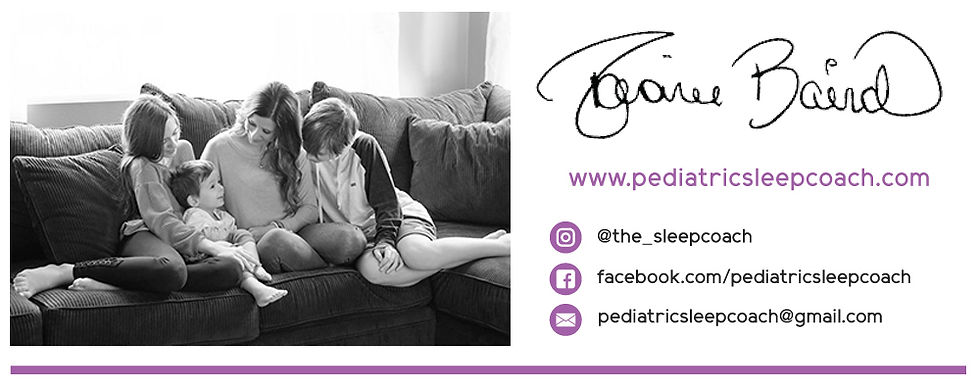How to survive and “manage” the 2 to 1 nap transition
- Desiree Baird
- May 7, 2019
- 4 min read
Updated: Nov 15, 2025
Out of all of the nap transitions that you will go through with your baby, the 2 to 1 nap transition seems to be the hardest for most parents (and for little ones alike). Why? Because their body is getting used to much longer wake times and consolidating all of their sleep in one single nap.
Although your friends, daycare centers or your parents will tell you that your little one should be on one nap at 1 years of age this is simply not true. The normal age for babies to transition to one nap is 14-18 months (with the average being 15 months).

Transitioning too early will almost always lead to a baby who becomes overtired and thus may begin taking short naps and/or waking several times throughout the night. My recommendation is to hold onto two naps as long as possible, even if that means getting creative and capping naps so that you allow time for two naps without bedtime being pushed out too late.
Common signs that baby may be ready to go to 1 nap include:
At least 14 months of age
Refusing the afternoon nap even after adjusting the awake time.
Afternoon nap is occurring too late in the day and thus pushing bedtime too late.
Night wakings that are otherwise unexplained.
Early wakings that are otherwise unexplained.
I think my baby is ready for one nap, what do I do?
With any nap transition you don’t want to just jump ahead without a plan and increase wake time by more than 15 minute increments. Jumping right to a 12pm nap time may work with some young toddlers, but with most children it ends up backfiring at some point. If you push too hard at once it can leave you with one overtired child who is a hot mess and beginning to wake up a lot at night and earlier in the morning because they are simply overtired.
Here’s what I suggest you do to get your toddler to transition smoothly to 1 nap. Remember, this is not a race, there is no need to rush things. Take it slow.....
So, let’s say your little one wakes up naturally at 7:00am and typically takes her first nap at 10:00am. For the first 3 days push her to 10:15am. If she wakes before noon, then offer a catnap sometime between 3:00pm – 4:00pm. If she doesn’t want to take a catnap, then opt for an early bedtime 6:00pm (or approx 5.5 - 6 hours after she awoke from her nap). After 3 – 5 days, move her nap by another 15 minutes to 10:30am, PAUSE, give this a few days, and then move her nap to 10:45am, and so on until you get to about 5.5 hours of total wake time in the morning.

So, if your little one wakes up at 7am, then her nap should eventually begin between 12pm/12:30pm (or 5.5 hours after she wakes for the day). However, don’t go too fast. Let’s say your little one is doing great with an 11:30am nap (4.5 hours of wake time in the morning from when she woke) and just gets way too overtired if you push the nap out later. In this case, just PAUSE. Stay here for a week or more, and then try pushing her nap out by another 15 minutes when she seems ready. Again, it’s ok not to rush to get to the 12/12:30pm nap time. I promise with time and patience you will get there.
As mentioned, at the beginning the transition the stretch between nap ending and bedtime will be long (about 5.5- 6 hours). So, you may start with the morning wake time at 3.75, and the afternoon will be 5.75 to 6 hours. But as you stretch the nap later in the morning to 5-5.5 hours after your baby wakes up for the day the wake time will decrease before bed which will be about 4.5/5 hours after the nap ends which is 10-10.5 hours of total wake time.
What is the end goal?
As mentioned earlier, eventually you will want the nap to be occurring around 12:30pm (or about 5.5 hours after baby wakes for the day) and bedtime to occur about 4.5-5 hours after the nap ends, this gives your little one 10-10.5 hours of total awake time for the day. Once you are on this schedule, your one nap is well-established and there is no need to tweak unless you are getting lengthy monkey business before the nap/bedtime.
As you go through this transition have patience.
As I have mentioned a few times, nap transitions can be hard, not to mention tricky. There's likely to be some short naps, some frustration, perhaps some night wakings, etc., but if you stay consistent and trust the process, it will all come together. Often, once parents don't see immediate results they are quick to switch things up and try something else, but with babies consistency is key.

As well, a nap transition doesn't just happen overnight. It can take weeks from the first day that you decide you are ready to drop the nap to when baby is well-established on their new schedule. Take it from me, when I originally wrote this blog post I was 2.5 weeks into my 2 to 1 nap transition with my 15.5 month old (14.5 mos corrected). He wakes at 7am, takes his first nap around 11:20am, and goes to bed between 7/7:30pm right now. We had to pause at 11:20am because 11:30am was just a little too much for him. How did I know? Because if I pushed him to 11:30am he would wake up after one sleep cycle. When I stayed at 11:20am, he would take a 2.5 hour nap. To get through the whole transition with my little guy it took about 6 weeks total.
Good luck, and if you have any questions drop a line below or reach out to schedule a call. Interested in working with me? Email me to schedule a FREE 30 minute discovery call!





Comments